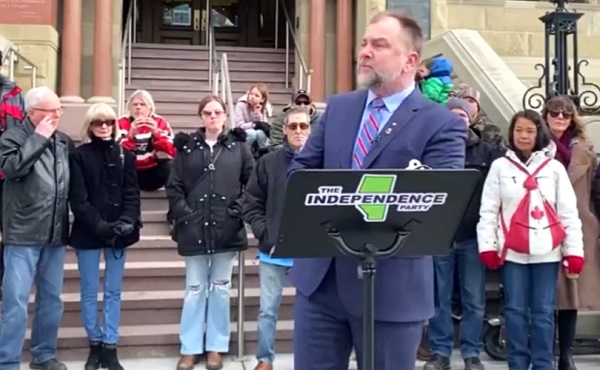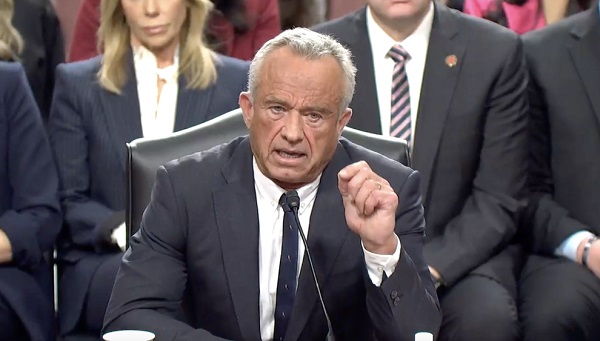Alberta
Alberta court upholds conviction of Pastor Artur Pawlowski for preaching at Freedom Convoy protest

From LifeSiteNews
Lawyers argued that Pastor Artur Pawlowski’s sermon was intended to encourage protesters to find a peaceful solution to the blockade, but the statement was characterized as a call for mischief.
An Alberta Court of Appeal ruled that Calgary Pastor Artur Pawlowski is guilty of mischief for his sermon at the Freedom Convoy-related border protest blockade in February 2022 in Coutts, Alberta.
On October 29, Alberta Court of Appeal Justice Gordon Krinke sentenced the pro-freedom pastor to 60 days in jail for “counselling mischief” by encouraging protesters to continue blocking Highway 4 to protest COVID mandates.
“A reasonable person would understand the appellant’s speech to be an active inducement of the illegal activity that was ongoing and that the appellant intended for his speech to be so understood,” the decision reads.
Pawlowski addressed a group of truckers and protesters blocking entrance into the U.S. state of Montana on February 3, the fifth day of the Freedom Convoy-styled protest. He encouraged the protesters to “hold the line” after they had reportedly made a deal with Royal Canadian Mounted Police to leave the border crossing and travel to Edmonton.
“The eyes of the world are fixed right here on you guys. You are the heroes,” Pawlowski said. “Don’t you dare go breaking the line.”
After Pawlowski’s sermon, the protesters remained at the border crossing for two additional weeks. While his lawyers argued that his speech was made to encourage protesters to find a peaceful solution to the blockade, the statement is being characterized as a call for mischief.
Days later, on February 8, Pawlowski was arrested – for the fifth time – by an undercover SWAT team just before he was slated to speak again to the Coutts protesters.
He was subsequently jailed for nearly three months for what he said was for speaking out against COVID mandates, the subject of all the Freedom Convoy-related protests.
In Krinke’s decision, he argued that Pawlowski’s sermon incited the continuation of the protest, saying, “The Charter does not provide justification to anybody who incites a third party to commit such crimes.”
However, defence lawyer Sarah Miller pointed out that that Pawlowski’s sermon was protected under freedom of speech, an argument that Krinke quickly dismissed.
“While the appellant is correct that peaceful, lawful and nonviolent communication is entitled to protection, blockading a highway is an inherently aggressive and potentially violent form of conduct, designed to intimidate and impede the movement of third parties,” he wrote.
Pawlowski was released after the verdict. He has already spent 78 days in jail before the trial.
Pawlowski is the first Albertan to be charged for violating the province’s Critical Infrastructure Defence Act (CIDA), which was put in place in 2020 under then-Premier Jason Kenney.
The CIDA, however, was not put in place due to COVID mandates but rather after anti-pipeline protesters blockaded key infrastructure points such as railway lines in Alberta a few years ago.
Alberta
Alberta Precipitation Update

Below are my updated charts through April 2025 along with the cumulative data starting in October 2024. As you can see, central and southern Alberta are trending quite dry, while the north appears to be faring much better. However, even there, the devil is in the details. For instance, in Grande Prairie the overall precipitation level appears to be “normal”, yet in April it was bone dry and talking with someone who was recently there, they described it as a dust bowl. In short, some rainfall would be helpful. These next 3 months are fairly critical.
Thanks for reading William’s Substack!
Subscribe for free to receive new posts and support my work.
Alberta
Alberta’s move to ‘activity-based funding’ will improve health care despite naysayer claims

From the Fraser Institute
After the Smith government recently announced its shift to a new approach for funding hospitals, known as “activity-based funding” (ABF), defenders of the status quo in Alberta were quick to argue ABF will not improve health care in the province. Their claims are simply incorrect. In reality, based on the experiences of other better-performing universal health-care systems, ABF will help reduce wait times for Alberta patients and provide better value-for-money for taxpayers.
First, it’s important to understand Alberta is not breaking new ground with this approach. Other developed countries shifted to the ABF model starting in the early 1990s.
Indeed, after years of paying their hospitals a lump-sum annual budget for surgical care (like Alberta currently), other countries with universal health care recognized this form of payment encouraged hospitals to deliver fewer services by turning each patient into a cost to be minimized. The shift to ABF, which compensates hospitals for the actual services they provide, flips the script—hospitals in these countries now see patients as a source of revenue.
In fact, in many universal health-care countries, these reforms began so long ago that some are now on their second or even third generation of ABF, incorporating further innovations to encourage an even greater focus on quality.
For example, in Sweden in the early 1990s, counties that embraced ABF enjoyed a potential cost savings of 13 per cent over non-reforming counties that stuck with budgets. In Stockholm, one study measured an 11 per cent increase in hospital activity overall alongside a 1 per cent decrease in costs following the introduction of ABF. Moreover, according to the study, ABF did not reduce access for older patients or patients with more complex conditions. In England, the shift to ABF in the early to mid-2000s helped increase hospital activity and reduce the cost of care per patient, also without negatively affecting quality of care.
Multi-national studies on the shift to ABF have repeatedly shown increases in the volume of care provided, reduced costs per admission, and (perhaps most importantly for Albertans) shorter wait times. Studies have also shown ABF may lead to improved quality and access to advanced medical technology for patients.
Clearly, the naysayers who claim that ABF is some sort of new or untested reform, or that Albertans are heading down an unknown path with unmanageable and unexpected risks, are at the very least uninformed.
And what of those theoretical drawbacks?
Some critics claim that ABF may encourage faster discharges of patients to reduce costs. But they fail to note this theoretical drawback also exists under the current system where discharging higher-cost patients earlier can reduce the drain on hospital budgets. And crucially, other countries have implemented policies to prevent these types of theoretical drawbacks under ABF, which can inform Alberta’s approach from the start.
Critics also argue that competition between private clinics, or even between clinics and hospitals, is somehow a bad thing. But all of the developed world’s top performing universal health-care systems, with the best outcomes and shortest wait times, include a blend of both public and private care. No one has done it with the naysayers’ fixation on government provision.
And finally, some critics claim that, under ABF, private clinics will simply focus on less-complex procedures for less-complex patients to achieve greater profit, leaving public hospitals to perform more complex and thus costly surgeries. But in fact, private clinics alleviate pressure on the public system, allowing hospitals to dedicate their sophisticated resources to complex cases. To be sure, the government must ensure that complex procedures—no matter where they are performed—must always receive appropriate levels of funding and similarly that less-complex procedures are also appropriately funded. But again, the vast and lengthy experience with ABF in other universal health-care countries can help inform Alberta’s approach, which could then serve as an example for other provinces.
Alberta’s health-care system simply does not deliver for patients, with its painfully long wait times and poor access to physicians and services—despite its massive price tag. With its planned shift to activity-based funding, the province has embarked on a path to better health care, despite any false claims from the naysayers. Now it’s crucial for the Smith government to learn from the experiences of others and get this critical reform right.
-

 Autism2 days ago
Autism2 days agoNIH, CMS partner on autism research
-

 Economy1 day ago
Economy1 day agoCanada’s Energy Wealth Is Bleeding South
-

 Business1 day ago
Business1 day agoTrump announces UK will fast-track American products under new deal
-

 Business2 days ago
Business2 days agoInnovative Solutions Like This Plan To Provide Power For Data Centres Will Drive Natural Gas Demand For Decades
-

 espionage1 day ago
espionage1 day agoHong Kong Police Detain Relatives of Canadian Candidate Targeted by Beijing Election Interference
-

 Alberta1 day ago
Alberta1 day agoAlberta’s move to ‘activity-based funding’ will improve health care despite naysayer claims
-

 International1 day ago
International1 day agoCardinals elect Robert Francis Prevost, first American pope to lead Catholic church
-

 Energy1 day ago
Energy1 day agoOntario Leads the G7 by Building First Small Modular Reactor








